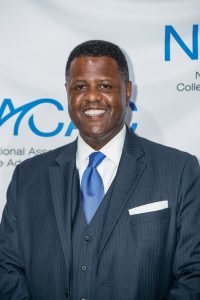The director of UConn’s strong undergraduate recruitment and admissions efforts has been chosen by his peers to lead their nationwide association, a testament both to his talents and the University’s successes in those areas.
Vern Granger, UConn’s director of undergraduate admissions in the Division of Enrollment Planning & Management, was elected chair-elect of the National Association of College Admission Counseling (NACAC)’s Board of Directors last month.

He will serve as chair-elect throughout the coming year, moving into the board chair position in September 2022.
Knowing that admissions counselors’ work directly affects students as they grow from young adults to professionals is at the heart of why Granger considers himself an “admissions counseling lifer,” he said when he was nominated last spring for the chair position.
The organization has more than 25,000 members worldwide and is one of the largest and most diverse membership associations in higher education. Granger’s election is only the second time in its 84-year history that a UConn admissions director has been tapped for the top position, with the first being John Vlandis in 1982.
“There is no greater recognition than that which comes from your peers. So, to be elected as chair-elect of the NACAC organization is such a great honor, and one I accept with great humility,” Granger says.
He adds that disparities in access to resources for students and schools provides NACAC an opportunity to become the foremost voice in areas of diversity, equity, and inclusion at its members’ institutions, and to advocate the urgent need to focus on affordability.
Granger, who attended college as a first-generation student of color, said one of the constants in his career has been the importance of mentoring and supporting students – particularly those from underrepresented communities.
That commitment is reflected in what he’s accomplished during his time at UConn so far: In each of the undergraduate admissions cycles during which Granger has been director, the University has attracted record numbers of students of color as part of the incoming classes.
Those classes have also set records for academic achievement and are thriving at UConn despite the recent pandemic-related complications that all institutions have faced.
Granger also is shepherding one of UConn’s most ambitious and impactful admissions initiatives, a three-year pilot test-optional process, in which students can determine whether they wish to submit scores from standardized testing to be considered in their admissions application.
UConn already uses a holistic application review process in which no single piece of an application, including standardized test scores, would be the make-or-break factor considered for an offer of enrollment.
About three-quarters of the four-year colleges and universities in the U.S. have either adopted test-optional or test-blind approaches this year, including many that participate in the NACAC organization of which Granger is the new chair, according to a new tabulation this fall.
At UConn, the current first-year class of students is the first cohort enrolled under that program, a group of highly accomplished new Huskies that also comprises the most racially and ethnically diverse class in its history so far.
“Vern’s extensive experience in the field of admissions and his leadership and passion for improving access to those underserved by our institutions make him one of the most ideal people in the country to take on this role,” says Nathan Fuerst, UConn’s vice president for enrollment planning and management.
“Vern has a proven track record of success in growing diversity among our students at UConn and at his prior institutions,” Fuerst adds. “We are proud of his accomplishments here, and proud that he will carry the banner of UConn with him at the helm of NACAC’s Board of Directors.”
Granger, a native of Ocean City, N.J., says his interest in admissions was first piqued when he was a student campus tour guide while attending the University of North Carolina at Wilmington, where he earned a bachelor’s degree. He also holds a master’s degree from North Carolina State University.
He began his admissions career at Louisburg College in North Carolina. Before joining UConn in 2018, he previously served as executive director of admissions at Ohio State University; director of admissions at the University of Tennessee, Knoxville; and senior associate director of admissions at North Carolina State University.
He began his term as chair-elect of NACAC during its national conference last month, where he was joined on the board by two secondary school professionals, Tahirah Crawford, college placement director at People’s Preparatory Charter School in Newark, NJ, and Edward Pickett III, college counselor and dean at Polytechnic School in Pasadena, CA.
“I am excited to welcome Vern, Tahirah, and Eddie to the NACAC board,” says Todd Rinehart, NACAC immediate past chair and vice chancellor for enrollment at the University of Denver.
“Their lived experiences, passion, and contributions to the profession align with the board’s vision to transform the association and help ensure postsecondary education is accessible, inclusive, equitable, and affordable for all,” he says. “We welcome their experience, energy, and ideas as we undertake the many challenges that lie ahead.”



